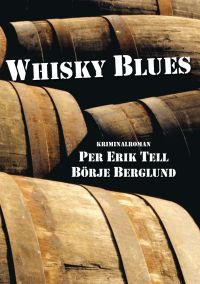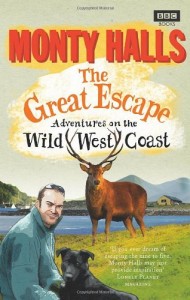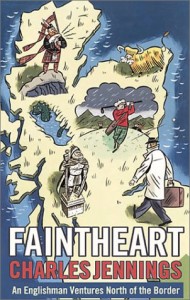 Det er to år siden jeg leste Whisky Blues av Per Erik Tell og Börje Berglund, og jeg skulle selvsagt ha skrevet om den før, men jeg utsatte det fordi jeg ville bruke tid på å skrive en skikkelig tekst, og nå har det vel strengt tatt gått for lang tid for det. Nåja, jeg husker sånn nogenlunde både handling og hva jeg likte og ikke likte ved boka, så helt i blinde jobber jeg vel ikke nå heller.
Det er to år siden jeg leste Whisky Blues av Per Erik Tell og Börje Berglund, og jeg skulle selvsagt ha skrevet om den før, men jeg utsatte det fordi jeg ville bruke tid på å skrive en skikkelig tekst, og nå har det vel strengt tatt gått for lang tid for det. Nåja, jeg husker sånn nogenlunde både handling og hva jeg likte og ikke likte ved boka, så helt i blinde jobber jeg vel ikke nå heller.
Boka ble til ved et samarbeid mellom whiskyentusiasten Börje Berglund og forfatteren Per Erik Tell. «Krim i whiskymiljø?» tenkte jeg, «Det høres jo lovende ut.» Historien foregår i flere tidsperioder, nåtid, 1980-tallet en gang og en episode i 1692. I nåtid skal et fat med «verdens beste whisky» – Cask 1692 – selges på auksjon, mange vil ha kloa i det, og vinnerne er et hemmelig konsortium som har som formål å bevare skotsk whisky skotsk. Men når fatet skal åpnes for første prøvesmak oppdager man et problem, det inneholder nemlig et lik. Dette ønsker naturlig nok hverken selger eller kjøper noe oppstuss om, og det hyres derfor inn en privat etterforsker, Angie Connors, fra London.
Parallelt fortelles historien fra 80-tallet der den litt enfoldige Oliver Campbell ankommer Pitlochry for å jobbe som postbud. Han befinner seg raskt midt i et sammensurium av kjærlighetsintriger og slektsfeider, og sliter i i tillegg med en onkel som har trukket i tråder for å skaffe ham jobben fordi han vil ha en gjentjeneste: Finn ut hva MacMillan Whisky Distillery egentlig driver med når de sier de skal produsere verdens beste whisky. Med andre ord: Stjel oppskriften.
Kriminalhistorien er egentlig helt grei. Intrigene er sånn passe innviklede, noen av skurkene er riktig så usympatiske, andre roter seg borti mer enn de er klar for. Angie Connors er en flott heltinne, jeg skulle gjerne sett mer til henne. Oliver Campbells amorøse eventyr i Pitlochry sliter jeg litt mer med, men er villig til å godta romanens premisser på dette feltet.
Alt rakner derimot når det kommer til det sentrale motivet, «verdens beste whisky». MacMillans vil ha oss til å tro at deres forfedre bragte med seg en hemmelig oppskrift for den perfekte whisky fra Irland i 1692, og at de nå har destillert etter denne oppskriften. Det er dette fatet, som etter 20 års lagring selges på auksjon. Kan man ingenting om whisky høres jo dette kanskje tilforlatelig ut, men beklager, jeg tror ikke et sekund på det.
For det første: All whisky – i alle fall skotsk single malt, som er det det tross alt er snakk om her – lages etter samme «oppskrift»: Maltet bygg, vann og gjær. Bruker du noe annet er det ikke lenger skotsk single malt. Variasjoner finnes selvsagt i gjærstammer, vannkvalitet og i byggtype, selv om hvor mye dette faktisk påvirker smaken er diskutert, men hovedpåvirkningen på en whisky kommer fra fatet (et sted mellom 50 og 80 % alt etter hvilken ekspert du spør), bruken av torv ved tørking av malten, fasongen på potstill’en din og hvor du kutter destillasjonen. Kommer du og sier at du har destillert «verdens beste whisky» etter en hemmelig oppskrift fra irske munker i det virkelige Skottland vil du bli ledd ut.
Og irsk oppskrift? Det er bare så vidt en skotte er villig til å innrømme at det lages ekte whisk(e)y i Irland, hen ville aldri gått med på en irsk oppskrift skulle være bedre enn den skotske.
For det andre: (Og det følger fra det første.) Fat kjøpes ikke blindt, ikke til den prisen. Enhver interessert kjøper ville forlangt å få en smaksprøve før de bød på fatet. Joda, fat byttes og selges til stadighet, både ulagrede og lagrede, men da beregnes prisen ut fra liter, prosent og alder. Sprit som potensielt er ferdiglagret blir testet underveis. Fatet kan ha hatt en feil så whiskyen er udrikkelig, er den lagret en anselig mengde år kan alkoholstyrken ha dyppet under 40 % slik at det ikke lenger kan kalles whisky, og så videre.
I det hele tatt er hele historien om fatet (ja, det også: Bare ETT fat? Hvordan i heiteste klarer et normalstørrelse destilleri, som MacMillan skal forestille å være, å produsere bare ett fat på en ‘run’?) så full av huller at det ødelegger boka som helhet. Andre detaljer som har med whisky å gjøre skurrer like mye, som at teknikeren som skal analysere fatets innhold (før man har funnet liket) kommer fra Dufftown. Dufftown er en trivelig by altså, men det er ikke her industriens laboratorier ligger. Og det bare fortsetter gjennom hele boka. Det hadde kanskje vært tilgivelig om det var en krim skrevet av en vanlig forfatter, men her markedsføres jo boka på basis av at whiskyentusiasten Berglund er medforfatter, og da må man faktisk få lov til å forvente noe bedre.
Artikkel om boka i Kristianstadsbladet.
(Innlegget er krysspostet til drikkelig.no.)

